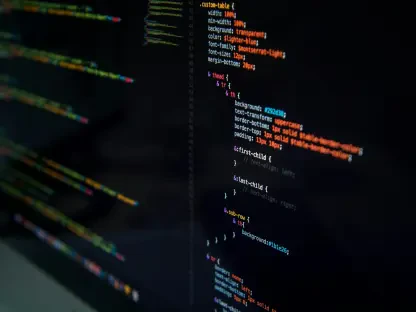The transformative potential of artificial intelligence (AI) in software engineering is reshaping the very foundations of the industry. Charting a speculative journey over four stages, AI evolution ranges from simple workflow improvements to the ambitious concept of fully autonomous AI developers. The profound implications of these advancements underscore both the promises and threats AI integration entails for the traditional software development landscape. As AI gradually evolves into a cornerstone of software engineering, it nurtures a new paradigm that demands a reevaluation of current practices, skillsets, and collaborative dynamics within development teams.
AI-Enhanced TODOs – The Seeds of Change
Transforming Traditional TODO Comments
The initial phase of AI integration in software engineering comprises AI-enhanced TODO comments within code, introducing subtle but essential changes in documentation and knowledge-sharing practices. Traditional TODO comments, often ambiguous, are reimagined into rich, context-aware snippets infused directly into codebases. This transformation isn’t just about replacing short notes with more verbose alternatives; it’s about embedding comprehensive insights within the development environment itself. With AI’s assistance, these TODO comments sprout detailed explanations, code snippets, links to pertinent documentation, and considerations for edge cases right within the development environment. This AI-generated detail enriches the understanding and usability of TODOs, creating a highly informative and context-specific guide for developers. This significant shift in embedding knowledge directly into the codebase facilitates a deeper understanding and more efficient collaboration among team members.
Benefits for Teams and Developers
The advantages of AI-enhanced TODOs are extensive. For one, they significantly enhance knowledge sharing within development teams. Developers now have access to more informative, context-rich insights that help demystify sections of code. This feature becomes invaluable during code reviews, offering reviewers clear and detailed explanations of specific pieces of code, and simplifies onboarding for new team members who rely on these enhanced notes for better acclimatization.By embedding knowledge directly into code, AI-enhanced TODOs facilitate a more seamless collaboration within teams. No longer are team members left guessing the intentions behind a TODO or the next steps required for implementation. Instead, they have a more structured and comprehensive guide built into their workflow. The appeal of these enhancements is profound not only in optimized efficiency but also in elevating the overall quality and coherence of the development process itself.
AI Assistant as a Team Member
AI Integration into Collaboration Platforms
Entering the second stage, AI transitions from task-specific tools to becoming integral members of the collaborative environment. AI systems are now part of platforms like Slack, functioning almost as non-human team members. These AI systems are equipped with a full knowledge base and customizable personas, actively participating in discussions, answering questions, offering insights, and conducting real-time code analysis. This leap from static documentation to active, intelligent engagement marks a significant evolution in team collaboration dynamics.Persistent context awareness across conversations and channels is a standout feature of this stage. AI assistants maintain project-specific documentation, provide immediate referencing capabilities, and offer real-time code analysis, further facilitating problem-solving and enhancing collaborative efforts. The integration of AI into these platforms doesn’t just offer passive support; it actively shapes and drives conversations, ensuring that team members have the assistance they need precisely when and where they need it.
Enhancing Team Productivity
The benefits of this level of integration are far-reaching. Teams experience rapid problem-solving with AI assistants providing on-the-spot solutions, filling knowledge gaps, and offering private tutorials for personalized learning. Furthermore, the continuous learning capabilities of these systems ensure they update and enhance their knowledge base with every interaction, thus growing more helpful over time. The AI learns and evolves, tailoring its interactions to better suit the needs and workflows of its human counterparts.Challenges remain, particularly in balancing data privacy with the need for comprehensive AI assistance. There’s also the risk of information overload, where too much assistance could impede human critical thinking. Examples like Microsoft 365 Copilot and Hebbia Matrix embody this stage of AI integration, showcasing how AI can autonomously manage data and enhance productivity effectively. By judiciously integrating AI into collaborative environments, development teams can amplify their efficiency, drive innovation, and maintain a competitive edge in a rapidly evolving technological landscape.
AI Development Agents – Guided Autonomy
Autonomous Code Handling Under Supervision
As AI matures further, it steps into the realm of autonomous code handling. In this stage, AI systems undertake complex tasks autonomously but still operate under human supervision. This marks a critical evolution where AI doesn’t just assist but actively participates in the software development process. AI development agents take on roles such as writing code, conducting code reviews, and testing and refactoring codebases. This heightened level of involvement accelerates development cycles, reduces bugs, and allows human developers to focus on higher-value tasks.Examples of these functionalities can be seen in tools such as GitHub Copilot Workspace, which integrates AI into development processes, facilitating code generation, review, and debugging under developer guidance. The integration of AI into these critical functions signifies a shift towards more efficient and streamlined development processes. By leveraging AI’s capabilities for complex, repetitive tasks, developers can concentrate on innovation, design, and strategic problem-solving, thus enhancing both productivity and creativity.
Implications for Human Developers
The implications of AI development agents are profound. Not only do they promise significant improvements in speed and consistency, but they also bring challenges regarding skill maintenance for human developers. There’s a changing landscape for human roles in development teams, with developers now focusing more on overseeing and guiding AI rather than executing repetitive tasks themselves. This shift necessitates a reevaluation of career paths and skill sets, ensuring that developers are equipped to work synergistically with their AI counterparts.Maintaining a balance between leveraging AI’s efficiency and ensuring developers continue to hone critical skills will be key to a harmonious evolution in this stage of AI integration. As AI takes on more complex tasks autonomously, developers must adapt, learning to harness AI’s potential while preserving the creativity, critical thinking, and innovation that only human minds can provide. By navigating these changes thoughtfully, the integration of AI development agents can lead to a more dynamic, resilient, and future-ready software engineering workforce.
Autonomous Virtual Employees – The Ultimate Frontier
Fully Autonomous AI Systems
The journey culminates in the futuristic stage of fully autonomous AI systems functioning as virtual employees. These AI entities are envisioned to handle entire projects or significant components of software development autonomously. With decision-making capabilities within their domain of expertise, these systems embody the zenith of AI integration in software engineering. Autonomous AI systems are characterized by their ability to manage projects independently, participate in team activities without human intervention, and continually learn and adhere to established standards.This level of full autonomy represents the ultimate progression of AI’s role within software engineering. However, it also introduces a range of ethical, economic, and practical considerations. The promise of fully autonomous AI systems could lead to unprecedented scalability and productivity, but it requires careful navigation to address the potential disruptions to the job market and the need for robust quality control mechanisms. Ensuring that AI decisions align with business goals and ethics, while mitigating safety concerns, will be paramount for organizations adopting these advanced technologies.
Ethical and Economic Implications
The transformative potential of artificial intelligence (AI) in software engineering is fundamentally reshaping the industry. This speculative journey through four distinct stages of AI evolution showcases a spectrum ranging from simple enhancements to workflows all the way to the bold idea of fully autonomous AI developers. These advancements highlight significant implications, bringing both promises and potential threats to the traditional software development landscape. Initially, AI starts by optimizing routine tasks, thus boosting efficiency and accuracy. As AI progresses, it begins to assist with more complex problem-solving and decision-making, gradually taking on increasingly sophisticated responsibilities.Over time, AI’s integration becomes deeper, necessitating a reevaluation of existing practices, skillsets, and the collaborative dynamics within development teams. With each stage of AI evolution, the role of human developers transforms, requiring them to adapt and cultivate new skills that complement AI capabilities. By the final stage, the concept of AI as fully autonomous developers could become a reality, potentially revolutionizing the industry but also posing ethical and practical challenges.As these technologies advance, the software engineering field will need to address important questions regarding trust, control, and the balance between human and machine contributions. The journey toward AI-driven software engineering is not just about enhancing productivity but also about reimagining how development teams function and how software is created, paving the way for a future where AI and human ingenuity coexist and thrive together.









